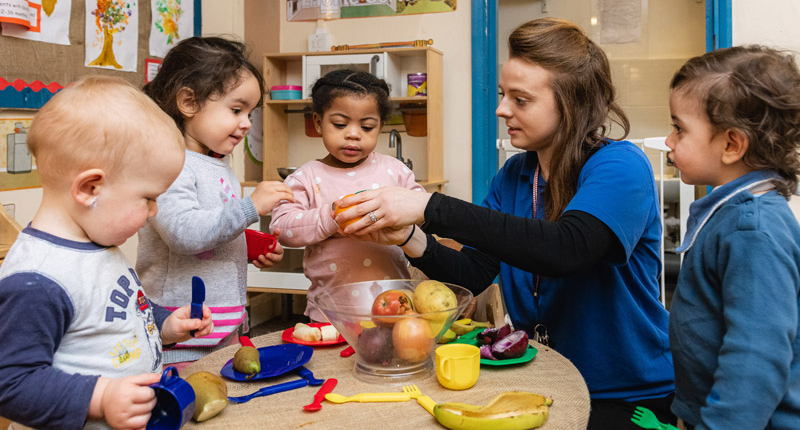Latest News & Information

Latest News & Information

Treetops Nursery
Our nursery & pre-school in Willesden, NW10, offers high quality childcare for babies & children aged up to 5 years. We’re also near Harlesden, Kensal Green, Willesden Green, NW2 and NW6.
Latest News
Contact Us
Treetops Nursery
Doyle Gardens
Willesden
London NW10 3SQ
020 8963 1259


Jolly Jokes for Toddlers & Preschoolers
Continuing the entertainment theme from last month, today’s post looks at some popular jokes for preschoolers and toddlers. These are great for childcare professionals and parents to keep up their sleeves and are sure to bring a smile to children’s faces. Each one passed our own ‘chuckle test’, so are popular with adults too.
Take a look below (click for a larger view) — after all, who doesn’t need a bit of silliness and happy children to brighten the day!
Willesden’s Place in TV, Song & Modern Culture
It’s surprising how many times Willesden and Willesden Green have made it into modern culture. After a little research, we’ve found that they’ve featured countless times on TV and in several pop songs, they’ve helped to launch careers of a myriad music legends and even shaped the global music industry. Take a look …
Willesden: Regular Filming Location for ‘Jonathan Creek’
Jack Dee’s ‘Lead Balloon’: Also Filmed in Willesden
‘Minder’ Used Willesden as a Film Location
Willesden also features in the British TV comedy-drama ‘Minder’ that was extremely popular on ITV/Thames Television from late 1979 through to the mid-90s. One of the two key protagonists, Arthur Daley (played by George Cole), kept a lock-up garage in Willesden and this is where he kept all his …
Overcoming Childhood Obesity — & Why it Matters
We previously covered the importance of healthy eating and exercise in children’s early years. Both play clear roles in a healthy lifestyle and in fighting potential weight and fitness problems. In today’s post we’ll take a closer look at obesity in young children, how to recognise it, and why it’s important to try to overcome it.
How to Recognise Obesity in Children
Apart from any obvious, physical signs, the easiest way to check whether your child has possible weight issues is to check their Body Mass Index (‘BMI’). While it’s not a perfect system, it’s an easy starting point to get a quick overview. The NHS has a great tool for measuring your child’s BMI, which you can access here. It’s quick, simple and free. Select the ‘Child’ tab at the top, enter their height, weight, date of birth, sex and the date of the measurements and then click the ‘calculate’ button at the bottom. Simple! The results are almost immediate and also include some useful guidance and links. Your child will fall into one of 4 possible categories:
guidance and links. Your child will fall into one of 4 possible categories:
You may find that BMI results reference centiles. These are a way of comparing a child’s BMI to those of other children of the same age. They use data from Nationwide surveys, which offer a useful comparator. For example, a boy who is on the 60th centile weighs more than 60 out of 100 other boys of the same age in the survey. The healthy weight category for children falls between the 2nd and
Top 25 Benefits of Breastfeeding
When it comes to breastfeeding vs. formula milk, there’s a good reason why the phrase ‘Breast is Best’ holds true. In fact, there are many benefits to breastfeeding including several for both baby and mother. Here are our top twenty-five:
15+ Breastfeeding Benefits for Babies
Formula Milk Guide
As a rule of thumb, the best type of milk for your baby is breast milk, given in tandem with suitable Vitamin D supplement drops. We’ve written a separate post about the benefits of breast milk here. Suffice it to say, though, that breast milk is best and has an enormous number of health benefits to both mother and child, including many that simply can’t be achieved by formula milk. That said, there are many reasons why formula milk may be the only viable option and we’ll explore the different types available in our Formula Milk Guide below.
First, though, some words of warning. There are several types of milk that you should never give to your baby if they’re under 12 months old.
Milk Types to Avoid Giving Babies Under 1
What Types of Formula Milk Can Your Little One Drink?
Note too, that there are many kinds of formula milk and one could argue that many of them are simply attempts by manufacturers to introduce niche products that appeal to a particular market or situation. As you’ll see, however, according to the NHS, some of the
Raising a Vegetarian Infant – Rough Guide
Breast Milk
Babies will usually have breast milk or formula milk up until they are at least 6 months old. If they are only receiving breast milk, it’s recommended that they are given a suitable Vitamin D supplement, available as drops.
Vegetarian Formula Milk
There’s no need for Vitamin D supplements, though, with high quality, age-appropriate formula milk, as it’s already included. Formula-fed babies under six months should, of course, be receiving ‘First Milk’ (otherwise known as ‘First Infant Formula Milk’) and this contains everything they need during the first six months. It can be supplemented by solids once they start weaning, usually from the age of 6 months through to a year old.
Vegetarian formula milks are usually based on cow’s milk although many other alternatives are available. Parents who wish to limit how much dairy products their infant consumes therefore have quite a wide choice but, if they’re avoiding dairy, they need to ensure that the formula milk is fortified with extra calcium and is unsweetened. They also need to read up because formula milk is a surprisingly big topic and can be a little bit of a minefield. There are several concerns over soya milk and rice milk, for instance, but those are just two examples. Check out our Formula Milk Guide for much more information about all the different kinds available as well as which formula milks to avoid.
Moving to Solids
From around the age of 6 months, your baby will usually start the process of weaning off of milk and begin to eat solid foods, albeit given in puréed or liquidised form initially. This is when parents then need to be mindful of their child’s nutritional needs and this is even more pertinent when bringing up a child as a vegetarian.
The four main food groups that need to be covered are:
Screen Time for Kids – The Benefits & Potential Pitfalls
Every parent knows that children love playing on handheld devices like mobile phones and tablets, as well as using computers and watching TV. To the very young, all these screens open up a magical world connecting them directly to colourful images, videos, music, sound and games. These can be almost addictive in their entertainment value for young children. However, is that a good thing?
When children are very young, they are at the pinnacle of their ability to be able to hoover up and absorb information and knowledge about the world. This makes them even more susceptible to being stimulated by the almost limitless array of entertaining content that electronic screens offer. So, surely giving them access to such screens is a good thing? Well … in moderation and with access to the right content it’s potentially hugely beneficial. However, there are compelling reasons why little ones’ access to electronic screens should be strictly managed. With that in mind, we’ll take a closer look at the topic to help parents make more informed decisions about how much time they allow their children to spend using mobile phones, tablets and computers, and watching TV.
Electronic Screens Teach Kids Stuff, Don’t They?
Parents will need to bear in mind, though, that the content also needs to be
Brushing Children’s Teeth – A Guide for Parents
As promised in our Guide to Teething last month, this next guide is all about brushing teeth — specifically for for babies, toddlers and young children. Regular brushing of teeth is an essential habit for young children to get into. Doing so will protect their teeth and oral health as they grow older.
When Should You Start Brushing Children’s Teeth?